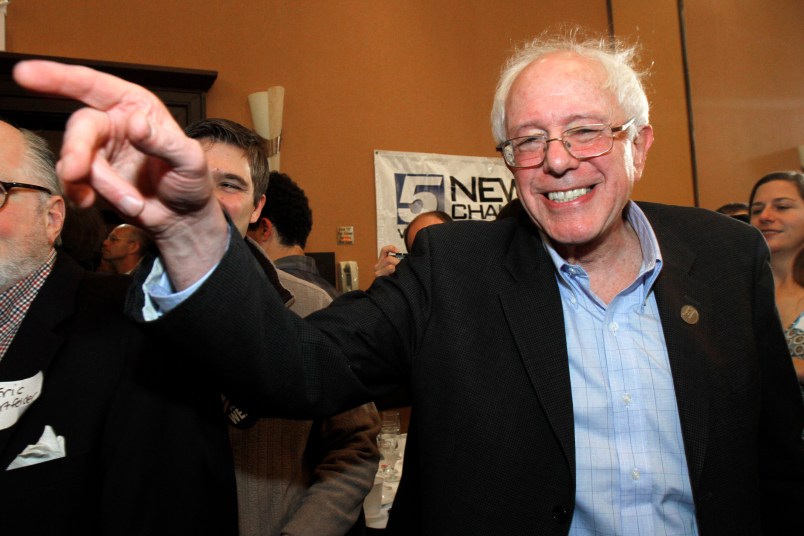Whatever the opposite of a presidential frontrunner is, Bernie Sanders — Vermont’s self-avowed democratic socialist senator — personifies it. But that hasn’t stopped him from entertaining 2016 ambitions.
In an interview with The Nation, published Thursday, Sanders said he was “prepared to run for president.” He’s not declaring a candidacy or even going through some of the necessary motions like fundraising just yet, but he said he is talking with “people around the country” and appears to have grappled with some of the toughest questions he would face: like whether he would run as an independent or a Democrat. It’s not the first time that Sanders has floated the idea, but it’s more concrete evidence that he’s taking it seriously.
“I am prepared to run for president of the United States,” he said. “I don’t believe that I am the only person out there who can fight this fight, but I am certainly prepared to look seriously at that race.”
The nascent Sanders campaign, if you will, appears to be a conscious effort to offer an alternative to the presumptive Democratic frontrunner: Hillary Clinton.
“The same old same old (Clinton administration Secretary of the Treasury) Robert Rubin type of economics, or centrist politics, or continued dependence on big money, or unfettered free trade, that is not what this country needs ideologically. That is not the type of policy that we need,” Sanders told the liberal magazine. “And it is certainly not going to be the politics that galvanizes the tens of millions of people today who are thoroughly alienated and disgusted with the status quo.”
“People are hurting, and it is important for leadership now to explain to them why they are hurting and how we can grow the middle class and reverse the economic decline of so many people,” he continued. “And I don’t think that is the politics of Senator Clinton or the Democratic establishment.”
But while that rhetoric might sound idealistic, Sanders seems to have thought practically about how the most liberal member of the Senate, and a politician who is registered independent, would mount a serious campaign. Asked if he would run as a Democrat or an independent, Sanders acknowledged the inherent risks if he chose the latter. He said he hadn’t decided.
Sanders also referred to the “Nader dilemma” as the undesirable scenario where he runs as an independent, siphons votes from the Democratic candidate, and a “right-wing Republican” wins the White House.
“Given the nature of the political system, given the nature of media in America, it would be much more difficult to get adequate coverage from the mainstream media running outside of the two-party system. It would certainly be very hard if not impossible to get into debates,” he said. “It would require building an entire political infrastructure outside of the two-party system: to get on the ballot, to do all the things that would be required for a serious campaign.”
Candidates run for president for various reasons, including to simply instigate a debate if there is a presumptive frontrunner, and it would be easy to view Sanders’s apparent flirting with a 2016 bid in that light. TPM couldn’t even find a poll where he had been floated as a 2016 candidate to gauge his standing with voters.
But, in his interview with The Nation, Sanders seemed serious about building a winning coalition.
“If I run, my job is to help bring together the kind of coalition that can win – that can transform politics. We’ve got to create a progressive agenda and rally people around that agenda,” he said. “I think we’ve got a message that can resonate, that people want to hear, that people need to hear.”






